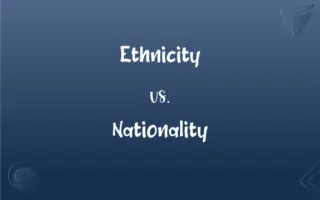Through vs. Throughout: What's the Difference?
Edited by Janet White || By Harlon Moss || Updated on October 25, 2023
"Through" indicates motion from one end to another, while "throughout" means in every part or during the entire time.

Key Differences
In the vast expanse of the English language, words like "through" and "throughout" often get confused due to their subtle differences. "Through" primarily denotes movement from one side or end to another, such as going through a tunnel or processing information through a system. This word conveys a sense of completion or transition.
"Throughout," on the other hand, communicates a sense of distribution or coverage across an entire area or time span. For instance, a rumor spreading throughout a community or a consistent theme throughout a book. It gives the impression of being omnipresent or widely dispersed.
The distinction can also be noted in their temporal contexts. If one were to say they worked "through" the night, it would imply they worked until the end of the night. Whereas, saying they worked "throughout" the night suggests they worked continuously for the entire duration of the night.
While both "through" and "throughout" pertain to span and extent, "through" leans towards transition and passage, and "throughout" towards comprehensive coverage. Recognizing this can aid in their precise application in sentences.
Comparison Chart
Basic Definition
Motion from one end to another.
In every part or during the entire time.
ADVERTISEMENT
Spatial Context
Passing or extending from one side to another.
Over or in every part of an area.
Temporal Context
Until the end of a period.
For the entire duration of a period.
Distribution
Doesn’t imply distribution.
Implies wide distribution or presence.
Completeness
Indicates transition or completion.
Indicates comprehensive coverage.
Through and Throughout Definitions
Through
Movement from one side to another.
He walked through the door.
ADVERTISEMENT
Throughout
In every aspect of.
There was consistency throughout his work.
Through
Completion of a process.
She read the book through in one sitting.
Throughout
Everywhere in.
The rumors spread throughout the town.
Through
By means of.
He made the sale through sheer persistence.
Throughout
In every part of a particular area.
Wildflowers grew throughout the meadow.
Through
As a result of.
Through his efforts, the event was a success.
Throughout
During the whole period of time.
He remained silent throughout the meeting.
Through
Extending from the beginning to the end.
She worked through the entirety of the project.
Throughout
From start to finish.
The theme was evident throughout the book.
Through
In one side and out the opposite or another side of
Went through the tunnel.
Throughout
In, to, through, or during every part of; all through
The road is kept open throughout the year.
FAQs
Is "throughout" more spatial or temporal?
It can be both, denoting coverage in space or continuous presence in time.
What's conveyed when someone worked "throughout" the night?
They worked continuously for the entire duration of the night.
How do "through" and "throughout" function in terms of distribution?
"Through" doesn't imply distribution, while "throughout" suggests wide distribution or presence.
Can "through" indicate a result?
Yes, e.g., "Through hard work, he achieved his goals."
How do "through" and "throughout" differ in terms of movement?
"Through" indicates movement from one end to another, while "throughout" implies presence in every part.
How does "throughout" depict extent?
It signifies something is distributed or present over the entire extent of an area or duration.
When talking about a consistent theme in a book, which is appropriate: "through" or "throughout"?
"Throughout" is appropriate.
Can "through" and "throughout" be used interchangeably?
No, their meanings differ; "through" denotes passage or completion, while "throughout" signifies comprehensive coverage.
How does "through" relate to completion?
"Through" can indicate the end or completion of a process or period.
Is "throughout" more about the "what" or the "when"?
It can be both, indicating what is distributed or when it's continuously present.
Can both "through" and "throughout" be used in spatial and temporal contexts?
Yes, but they convey different nuances in each context.
Which word indicates a comprehensive presence: "through" or "throughout"?
"Throughout."
Can "through" indicate a means or method?
Yes, e.g., "She succeeded through determination."
Which word is more about transition, "through" or "throughout"?
"Through" leans more towards transition or passage.
How do "through" and "throughout" relate to completeness?
"Through" indicates transition or completion, "throughout" suggests comprehensive coverage.
What does it mean when someone worked "through" the night?
It means they worked until the end of the night.
Can "through" refer to a span of time?
Yes, indicating a period from start to end.
Is "throughout" limited to physical presence?
No, it can also imply temporal duration or consistency in aspects.
When emphasizing passage, which word should be preferred?
"Through."
If I want to emphasize continuous activity, should I use "through" or "throughout"?
"Throughout."
About Author
Written by
Harlon MossHarlon is a seasoned quality moderator and accomplished content writer for Difference Wiki. An alumnus of the prestigious University of California, he earned his degree in Computer Science. Leveraging his academic background, Harlon brings a meticulous and informed perspective to his work, ensuring content accuracy and excellence.
Edited by
Janet WhiteJanet White has been an esteemed writer and blogger for Difference Wiki. Holding a Master's degree in Science and Medical Journalism from the prestigious Boston University, she has consistently demonstrated her expertise and passion for her field. When she's not immersed in her work, Janet relishes her time exercising, delving into a good book, and cherishing moments with friends and family.































































